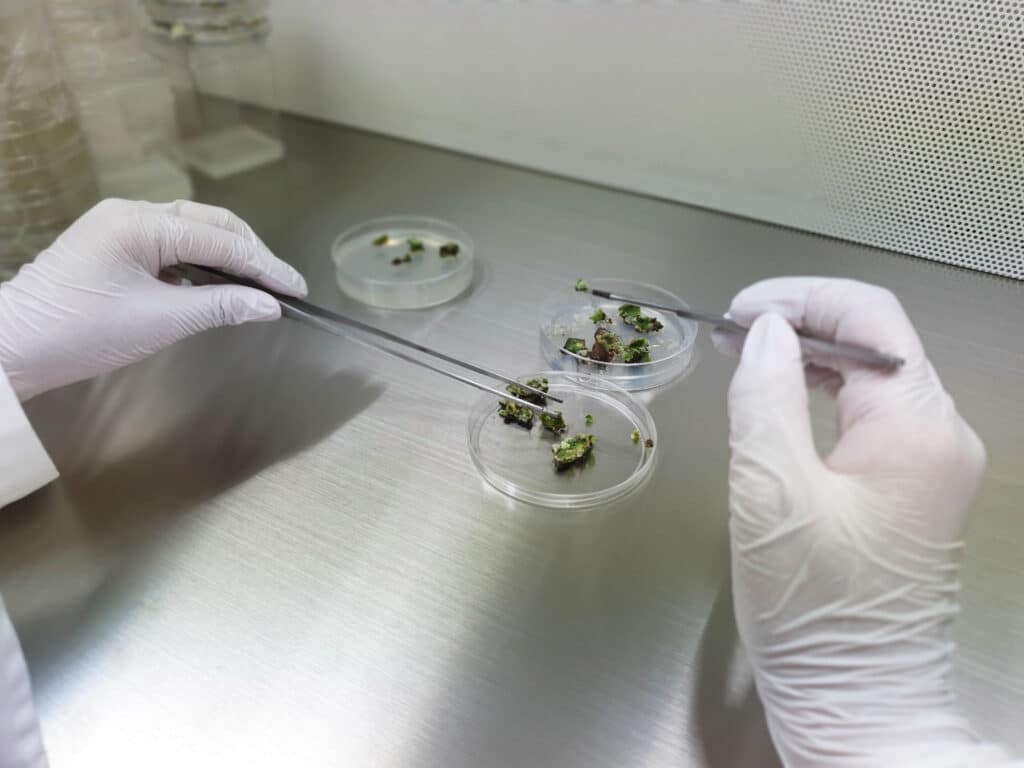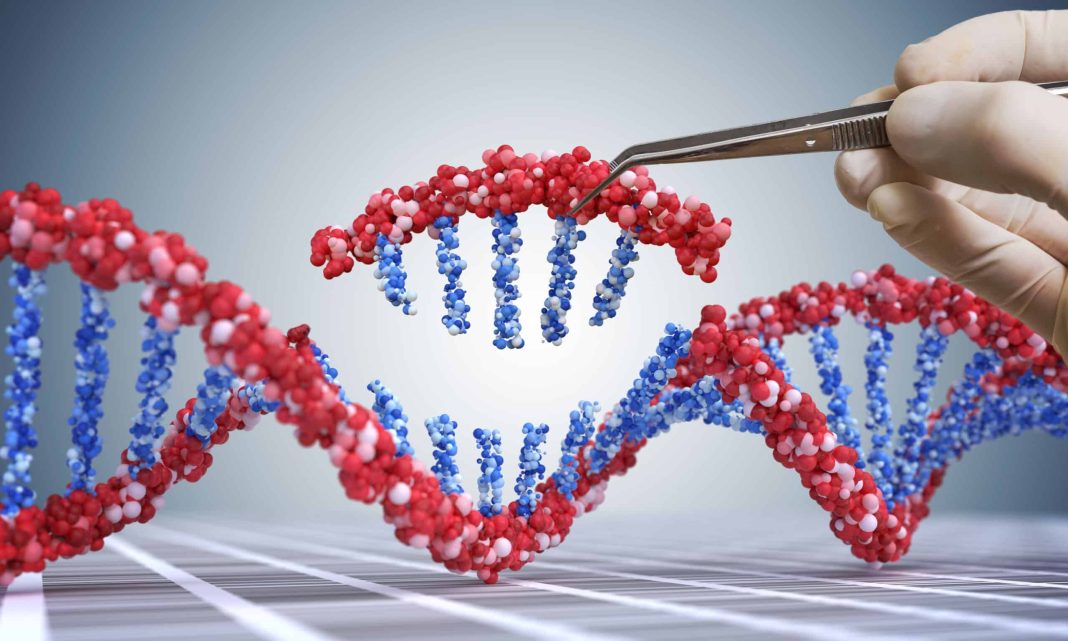The term GMO can now be attached to yet another product. Yup, genetically modified hemp is coming your way. Which begs the questions…what’s wrong with the real thing?
This article is the opinion of the author concerning the approval of genetically modified hemp.
What does GMO mean?
The term GMO stands for ‘genetically modified organism.’ The definition, according to Britannica, is an “organism whose genome has been engineered in the laboratory in order to favour the expression of desired physiological traits or the generation of desired biological products.”
This is different from general breeding tactics used to pick out, or accentuate, certain traits. Standard breeding tactics involve taking an individual from a species (plant or animal); and breeding it with other specific individuals to bring certain traits out. In cases of selective breeding, its just a matter of picking the animals or plants that go together, and hoping for the right outcome; but nothing about the organisms is actually changed.
Genetic modification is not about breeding two animals and hoping the offspring is as desired. Nor is it about putting plants in close proximity with hopes their genes mix. Genetic modification requires a lab setup, wherein technologies related to recombinant genetics and reproductive cloning, are employed. The two do different things, that both alter the genome of an organism at the molecular level.
In processes of recombinant genetics, specific parts of DNA are isolated, and played around with. Genes from one organism are inserted into another organism’s DNA. The other option, reproductive cloning, involves taking the nucleus from a cell meant to be cloned, and sticking it into a host egg that had its own nucleus removed. The latter is meant to create an identical offspring to the host.
It’s not just about playing around with the genes inside of one particular species, though. Genetic modification can involve changing the genetic structure of an individual, by including genes from a totally different species. This can’t be done through selective breeding; as it means mixing the genes of completely different species.
To give an idea how long these practices have gone on, the US began approving GM agricultural products for humans to consume, in 1944. This exemplifies the use of recombinant genetics. The first animal born from reproductive cloning, was born in 1996. GMOs are so common now; that by 2015, approximately 90% of all corn, soy, and cotton cultivated in the US, were genetically modified. GMO meat is already on shelves, and synthetic milk is now under investigation.
Genetically modified hemp
The reality of the three crops just mentioned, is that they grow just fine without any genetic tinkering. We know this because they’ve been cultivated for thousands of years. The general question of ‘why,’ is an excellent one, when it seems that our food was just fine before these weird practices. That ‘why’ does not generally get a good answer; and the only one to make sense in the end, is simply the idea of profit. The sad truth is, not many people understand the extent of this, or would think to question that their regular food products, have been so greatly engineered.
The new story now, as reported by Marijuana Moment, is that the US government recently approved genetically modified hemp plants. The plants in question, which were engineered to have lower levels of both THC and CBC (cannabichromene); were created by biotech company, Growing Together Research. This approval comes from the USDA, which means it deals with plant cultivation only. An actual product approval, would have to come from the FDA.
Growing Together Research did not account for why its necessary to cultivate completely THC-free hemp; as the amount of THC produced by hemp plants is not enough for intoxication. This makes the idea of a need for it, unnecessary from the get-go. Instead, the company simply stated it had created “the first known stable transformation and regeneration of multiple THC-free hemp cultivars.”

Beyond advertising these new plants as not containing THC or CBC, the company also claims the plants are more resistant to herbicide bialaphos. This implies immediately that the company already expects the plants to be exposed to this; which also immediately says a lot about the legal cannabis industry, and the increased use of chemicals like herbicides.
In its request to the USDA Animal and Plant Health Inspection Service (APHIS), the company explained that whatever it did to mess with the resistance to the herbicide, “is not expected to result in any other material changes to metabolism, physiology or development of the plant.” The words “is not expected” are interesting; because they imply that the company does not know this for sure; and can only say what it thinks will happen. And yet, the USDA approved it.
The company says it created the genetically modified hemp not just from hemp plants. The plant maelstrom also includes genetic information from bacteria, a virus, as well as at least one sequence which was artificially created. Another weird thing about this, is that APHIS actually responded to the application by saying the product did not have to abide by 7 CFR part 340, regulations specifically for monitoring GM product movements. Even though it is very much a GM product.
Is GM hemp necessary?
Not only can we ask the question of whether GM crops are necessary in general; we can now specifically ask if genetically modified hemp is necessary. ‘Weed’ gets its name for how incredibly easily it grows. It’s literally a weed in tons of places. For all the work we put into getting the right grow lights, and timing out a harvest; the truth is that these processes are for creating stronger versions. The plant itself grows just fine, and in varied conditions.
So why do it? Why expose a population of people to weird processes, especially when it concerns things like food or medicine? And why do it when the practices cannot be verified as safe in the long term? The FDA will tell you its to help farmers from losing crops, or controlling weeds; but this is nonsensical at best. All the stated GM plants thus far (cotton, soy, corn, weed) do just fine on their own. They grow even when we don’t plant them. Sure, things come up in life; but does the chance for bugs here and there necessitate changing the genetics of plants we eat?
I mean, why not just use natural fertilizers and natural insecticides; and simply not worry about possibly harming peoples’ health? Farmers have been dealing with the same issues of weeds and pests since the beginning of farming; and we lasted all the way until now. History tells us we don’t need this. What massive, nonnegotiable need became so strong in just the last decades, that requires us to use scientists to make our basic food in a lab? When you take a step back, it’s a crazy argument that we do.

Is it perhaps related to the basic idea that plants can’t be patented? If a big corporation wants to make a plant product, it has to essentially invent the plant. It can’t take something that grows naturally and stick its own sticker on it. But it can do that when it changes the genetics of the plant, or creates something from it that doesn’t exist in nature. Today’s pharmaceutical industry is a great example of this. Rather than market plants, it changes them; often to stronger and scarier versions that can be detrimental to health.
Think synthetic opioids. We would’ve been fine with the painkilling abilities of opium; but instead we have products like fentanyl marketed to us. If that point sounds weird, given all the fear about fentanyl; you’ll want to remember its made in a lab as an alternate medicine to the natural opium plant; and was approved wholeheartedly by the FDA, which continues to allow its production, prescription, and sale. This goes past genetic modification, into completely synthetic drugs; but the reality is that they’re not far apart, and both require synthetic processing.
There is a huge controversy over GM foods; because the long term effects are not known. There is plenty of research indicating that GM foods can lead to numerous health problems, including cancer; yet this is often downplayed. If this were a do-or-die situation, it might make sense; but we’ve been agriculturalists for millennia without having to resort to genetically modifying food. Why logically, would lab-produced food, ever be a better answer to the real thing? The excuse that we need it to feed the world, is baseless reasoning at best; which promotes corporate agriculture, and not our health or well being.
Conclusion
Genetically modified hemp, and GM cannabis in general; were not hard to predict in our world that likes to mess with everything. Are they necessary? Of course not! But then, what genetic modification process is when it comes to our food? This just seems like big business at it again; ready to ruin what should be a natural thing. But don’t worry, you still have the real thing available to you; which means even with the growth of GM hemp, you can still use the regular plant instead.
Welcome to the site! We appreciate you vising us at Cannadelics.com; the #1 spot for independent reporting on the drugs world at large; with a focus on cannabis and hallucinogens. Don’t be a stranger, come by frequently for updates; and sign yourself up to the Cannadelics Weekly Newsletter; so you’re always up on what’s going down.





